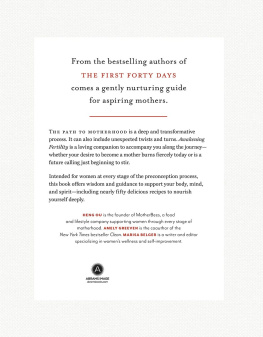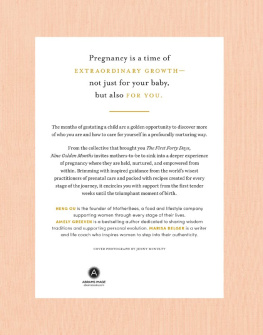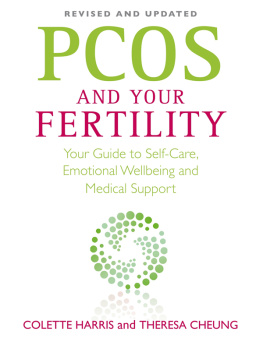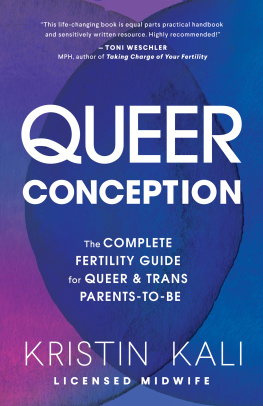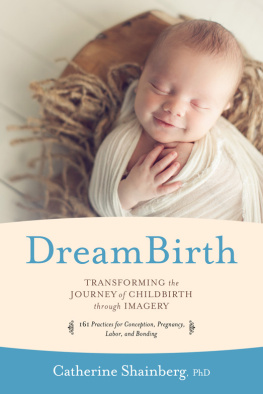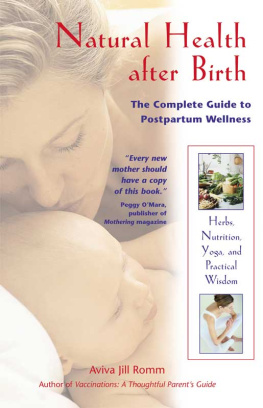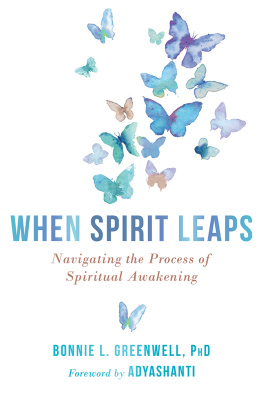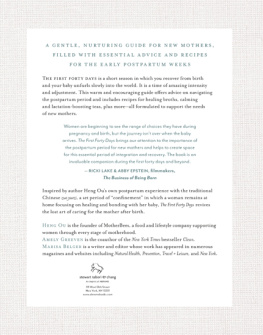Contents
Guide
Page List
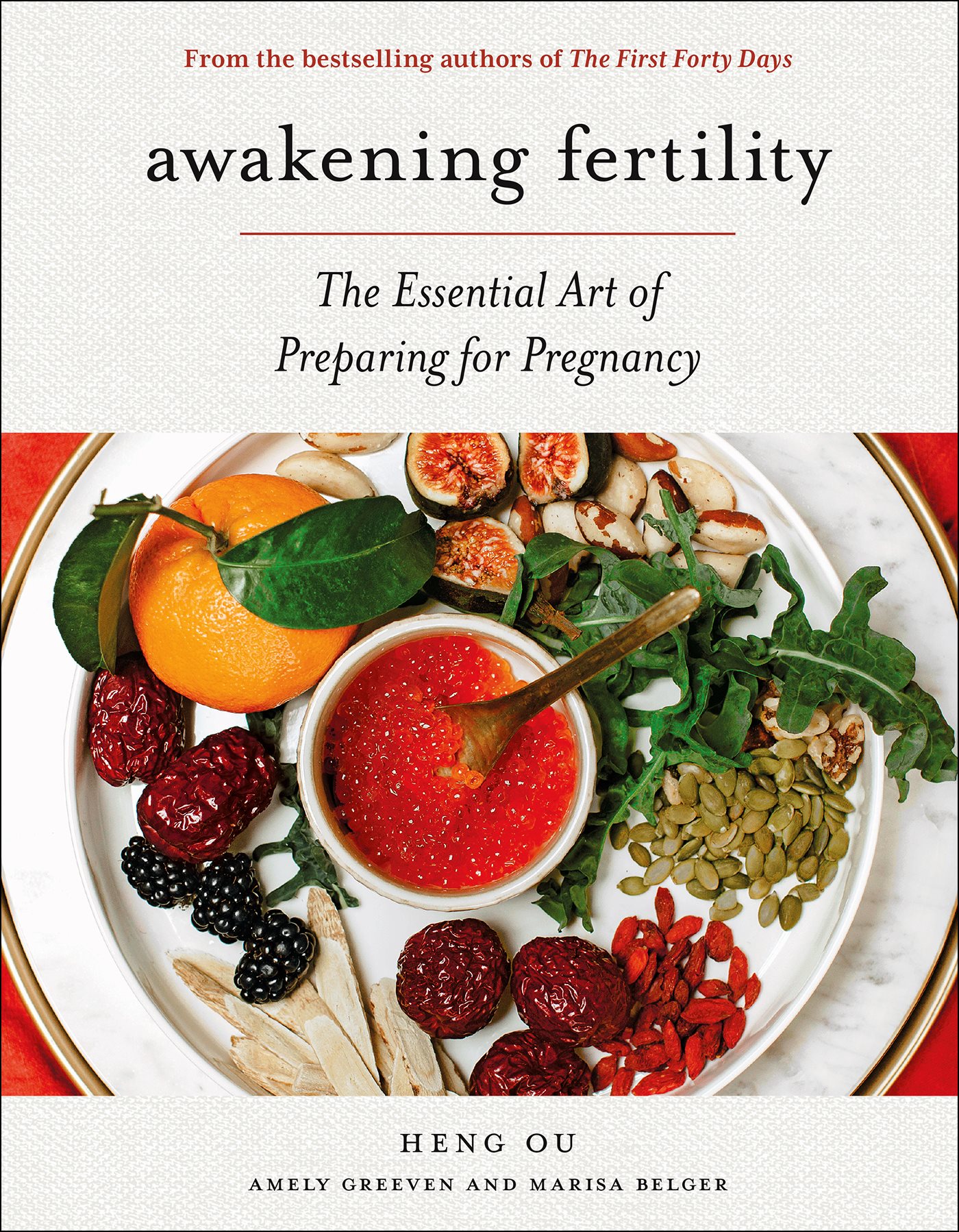


CONTENTS
1
the three universal themes and the five realms of discovery
2
dreaming
3
preparing
4
clearing
5
fortifying
6
conceiving
7
recipes
INTRODUCTION
You want to have a baby.
The desire to become a mother, or a mother again, can manifest in many ways. It might bubble up out of the blue and surprise you, or it might pulse enduringly, like an ache that is never not felt. Whatever form it takes, the moment you feel this call toward childbearing, a doorway opens, leading you to a path that will take you from one version of yourself to the next. It is a path of becoming.
We take many journeys of becoming in our lives: becoming an adult; becoming a professional; becoming a partner or a spouse or a member of a community. Yet the path of becoming a mother is a phenomenon unto itself, one taken largely out of sight, as publicizing ones desire to conceive a child and the ups and downs involved still feels taboo to many. And its one with a uniquely unfixed destination, in which pregnancy and motherhood can sometimes seem within easy reach and other times like a confounding, illusory mirage. You may be called toward having a baby, but when, how, and even if youll arrive there are not factors you can predict or control.
What adds more layers of challenge is that, today, women tend to set out on their mission toward motherhood in something of a scramble, without proper briefing, backup, or help prepping and securing the vessel for safe, strong passage. All great voyagers know that a ventures success depends on deep preparation. Yet when it comes to pregnancy, we often take the leap without first strengthening our sea legs. Its not a stretch to say that many women today are highly stressed and minimally rested, overfed yet frequently also undernourished, and hyperconnected yet poorly supported.
Perhaps because pregnancy is such a clear and decisive state of being, full of excitement and possibility, its easy to overlook, or even disregard, the more mundane preparation phase. But for a woman the consequences of skipping this phase are real, from having difficulty conceiving, to significant postpartum depletion (a baby takes what he or she needs in utero, even at the expense of the mothers well-being after birth), or simply experiencing a pervasiveand largely unnecessary!anxiety about the whole process.
In traditional wellness practices, setting a course for pregnancy didnt leave a woman scrambling to make a lifestyle U-turn or abruptly dropping one way of being in order to take on another. Thanks to a continuum of selfcare that was initiated when her fertility potential was first expressedwith the onset of menstruationshe was more ready and primed for conception when the time came. Early on, she was naturally guided into a lifestyle promoting inner balance and ongoing fortification, with the possibility of pregnancy always in mind. Today, our path toward pregnancy looks quite differentthe women of yesteryear would no doubt be shocked at the way we embark on the journey toward motherhood! But how are we supposed to know better? Preparing for pregnancy is a conversation that isnt being had: this wisdom is not passed down from mother to daughter, is not shared in school, and its not a topic that your doctor will bring up. As a society, we like results but get bored with process; we love to gaze at destinations but dont have the patience to hear about the journey. Making space for all that occurs along the intimate path to becoming a mother, and finding support during the bumps on the road, can be a challengeif were even aware that this preparation time is something we deserve to claim for ourselves!
Reclaiming these vital phases of the mothering journey and supporting a womannot just her babythrough every stage is my focus and my passion. Ten years ago, I began cooking food for new mothers inspired by the traditions of postpartum care and nourishment I had inherited from the Chinese medicine healers in my Chinese-American family. I called my food-delivery service MotherBees, to help each new woman feel like part of a buzzing hive of care at a time when she can so often feel alone. The idea struck a chordturns out there was quite a need for this kind of care!and I recruited two good friends, the writers Amely Greeven and Marisa Belger, to create a book called The First Forty Days. It translated the traditional Chinese protocols of zuo yuezi, or confinement care, into something more fit for modern families livesreplete with comforting and rebuilding recipes.
The First Forty Days shone a spotlight on a long overlooked phase of the mothering journeythe early days and weeks after the birth of a babyand reminded us collectively to honor the needs of a woman in this time. In weaving together global postpartum protocols, we discovered just how much targeted care for the new mother influences recovery, bonding, and replenishment, and carries longer-term consequences for her health and well-being. Inspired, we invited women and their partners to learn these principles before giving birth and to reframe the early weeks after delivering their baby as a sacred period of rest and recovery instead of viewing it as a trampoline to launch them back to an earlier version of themselves.
The response to The First Forty Days took our breath away, as one woman shared it with another, often posting pictures on social media of the book open on her kitchen counter or in a stack of night-table reads preparing her for whats to come. Midwives, doulas, and obstetricians began telling us they were giving the book to pregnant clients as a way to extend their reach of maternal care past the babys arrival. To this day, we receive messages from women around the world sharing how they are making space for a supported first forty daysand underneath the images of the homemade soups and stews theyre preparing before birth or receiving during their recovery is a sense of relief: Im not the only one going through this moody, sweaty, unpredictable phase of adjustment and upheaval. Someone else really gets it. Im not alone.
A couple of years after the publication of The First Forty Days, women began asking us a whole new kind of question: Was there a zuo yuezilike protocol of food and self-care they could use before becoming pregnant, to help conception come more easily and pregnancy go smoothly? The truth is, there was not. In the old, traditional ways of Chinese medicine, from an early age women were guided to care for their essence of life, called jing, to regulate their menstrual cycle, and to eat earthy, building, and restorative whole foods that nourished their reproductive center in anticipation of their mothering years. It was an ongoing lifestyle of caring for fertility potential, not a short program. Could we shake this out, we wondered, extract the essential nuggets from this continuum of self-care and turn them into something modern women could use? It had never been done before.
And so this book was conceived.
We began a wide-ranging exploration of the subject, each one of us putting out the call to our circles of practitioners, healers, guides, and mentorsthe wise women and wise men, too, who have generously brought their profound depths of experience and wisdom to our mothering books (see for a full list). In

